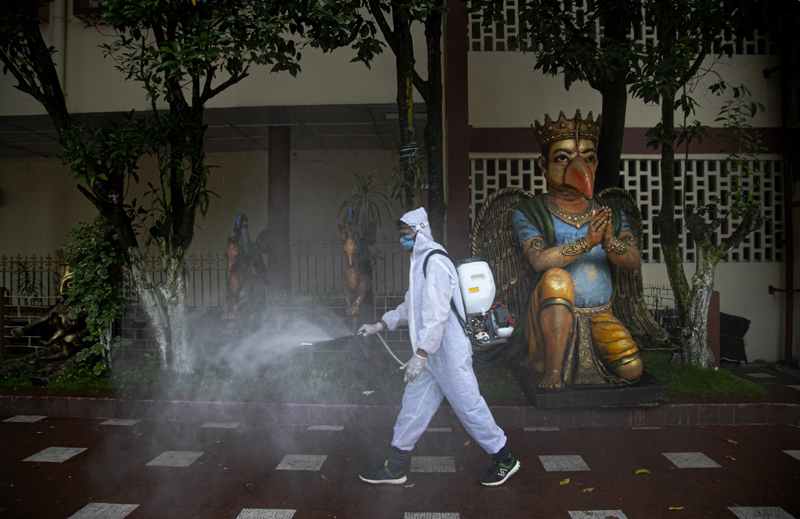Asia Today: India's virus death toll rises, Seoul cases jump
NEW DELHI: India's coronavirus death toll overtook Britain to become the fourth-highest in the world with another single-day record increase in cases Friday.
According to the Health Ministry, India reported 1,007 deaths in the past 24 hours. Its total rose to 48,040 deaths, behind the United States, Brazil and Mexico.
India's confirmed cases reached 2,461,190 with at single-day spike of 64,553 cases reported in the past 24 hours, the ministry said. India is behind the United States and Brazil in total positive cases. More than 70% of people infected in India have recovered.
The daily increase in newly reported infections was around 15,000 in the first week of July but jumped to more than 50,000 in the first week of August. The ministry cited its testing efforts, with more than 800,000 tests in a single day, taking cumulative tests to more than 26 million.
Health experts say it needs to be higher, given India's population of 1.4 billion.
India's two-month lockdown imposed nationwide in late March kept infections low. But it has eased and is now largely being enforced in high-risk areas. The new cases spiked after India reopened shops and manufacturing and allowed hundreds of thousands of migrant workers to return to their homes from coronavirus-hit regions.
Subways, schools and movie theatres remain closed.
In other developments in the Asia-Pacific region:
— South Korea reported 103 new virus cases, one of its biggest daily jumps in months, as officials express concerned that infections are getting out of control in cities. Eighty-three of the new cases were from the Seoul area, and infections were also reported in Busan, Gwangju and Ulsan. South Korea on July 25 had reported its first daily jump over 100 in nearly four months, driven by infections found among South Korean construction workers airlifted out of Iraq. Friday's jump was more concerning as it was driven by local transmissions, which health authorities said could worsen because of the increase in travellers during the summer vacation season. Prime Minister Chung Sye-kyun said authorities will be forced to consider elevating social distancing measures in the greater capital area -- something policymakers had been reluctant to do over economic concerns -- if transmissions continue to rise.
— North Korean leader Kim Jong Un lifted a lockdown at a major city near the border with South Korea where thousands had been quarantined for weeks over coronavirus worries. But Kim also insisted the North will keep its borders shut and reject any outside help as it carries out an aggressive anti-virus campaign. State media also reported Kim said at Thursday's ruling party meeting that the virus situation in Kaesong was stable and expressed gratitude to residents for cooperating with the lockdown. The lockdown was ordered in late July after North Korea claimed of finding a person with COVID-19 symptoms. It later said the person's test results were inconclusive.
— Health authorities are investigating whether shipping workers were a source of New Zealand's first domestic coronavirus outbreak in more than three months. The outbreak has grown to 30 people and extended beyond Auckland, the country's largest city, for the first time. Prime Minister Jacinda Ardern is scheduled to announce later whether a three-day lockdown in Auckland would be extended past Friday, which seemed likely given the increase in cases. Until this week, New Zealand had gone 102 days without community-spread infections, with the only known cases all in quarantined travellers. Health officials believe the outbreak started with a returning traveller or a border worker but are still investigating the origins.
— China reported eight new cases in the northwestern region of Xinjiang where the country's latest major outbreak has been largely contained. Another 22 new cases reported Friday by the National Health Commission were Chinese travellers returning home. Hong Kong reported another 69 cases and three deaths over the past 24 hours. The semi-autonomous Chinese city has required masks be worn in all public settings, restricted indoor dining and enacted other social distancing measures to bring down transmissions.






